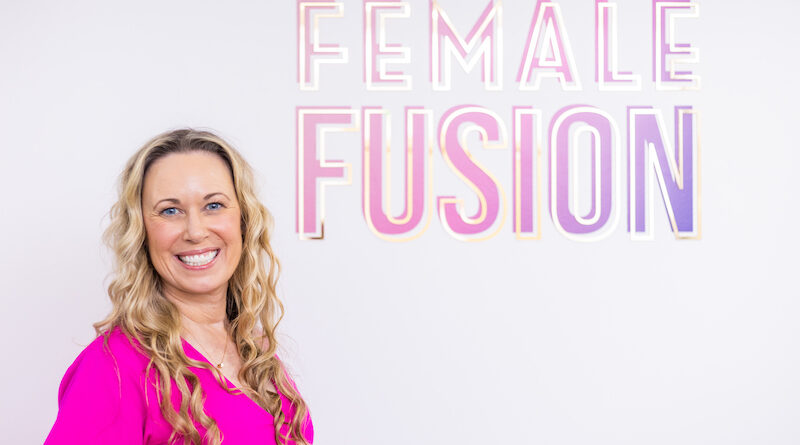I would love to begin with you telling us a bit about yourself.
I’m originally from Canada, but I left home 25 years ago and never looked back. My hunger for doing my own thing took me around the world where I started multiple seven-figure businesses. My first foray was into PR and communications specialising in trade disputes and mergers involving the European Union and World Trade Organization, but once I tasted entrepreneurship, I couldn’t stay away.
More than 20 years ago, I started a PR agency, followed by a training company focused on communications, and today I own a media and public speaking training company called The Communications Works. The more I grew, the more I realised I can use my experience to help other women by supporting them in their own businesses, particularly during the pandemic when so many had lost their jobs and wanted to create their own businesses. Originally it started as a Facebook group for friends to talk about business, became Female Fusion, the UAE’s largest community for women entrepreneurs, which currently stands at more than 30,000 members.
You are a seasoned entrepreneur yourself, so tell us what are some of the challenges one might face growing a business and is there a gender aspect to it as well?
 Even though it’s 2022, we’re still dragging our feet in global business when it comes to the advancement of women in the workforce. Whether it’s in building a career in corporate life, running one’s own company or acquiring funding as a start-up, opportunities for women are still in single-digit percentages. It’s well known that globally, women-owned businesses make up half of the registered businesses and yet they only receive one to two percent of contracts.
Even though it’s 2022, we’re still dragging our feet in global business when it comes to the advancement of women in the workforce. Whether it’s in building a career in corporate life, running one’s own company or acquiring funding as a start-up, opportunities for women are still in single-digit percentages. It’s well known that globally, women-owned businesses make up half of the registered businesses and yet they only receive one to two percent of contracts.
Many pandemic passions have turned into businesses; however, nobody teaches you how to run a business, at least not in the practical sense. We learn a lot in theory, but there’s no real way to learn unless you’re doing it yourself.
Being a female entrepreneur is not easy, the biggest reason being she has to prove herself at every stage of her growth. We’re still a pilot project, particularly in certain cultures. It may be difficult in a society dominated by men, but women today are far more resilient than most give us credit for.
A major challenge is that it’s sometimes a struggle to get people to take our ideas and strategies seriously. In many companies, it’s sometimes an act of courage for a woman to speak up and give a suggestion for fear of being ridiculed or ‘tut tutted’ as naive. And if the idea is good, there’s the added concern of a male colleague taking credit for it.
Additionally, funding is a concern. It is harder for women to raise funding for businesses than men. It isn’t even something we only see in business set-ups, we face such concerns even with family and friends. While most will support in principle, when it comes to supporting investors, suddenly the business isn’t as solid as they initially agreed. It’s discouraging when those close to us don’t consider us business-savvy enough.
We have to continuously fight to be taken seriously and then taken seriously enough to fund future growth. A few others off the top of my head include access to critical resources for success, a lack of access to initial start-up capital, no clear options or support for scaling, and a scarcity of logistical and bureaucratic support, particularly where legislation in favour of women takes time to implement. Thankfully, the UAE is a stark outlier in that it is quickly addressing all these concerns and creating an environment of real support with business councils specifically created for women in each Emirate and funding for local women entrepreneurs.
Why is women’s leadership beneficial for a business?
I remember reading a great piece by the Rockefeller Foundation some time ago on this, and I’d like to paraphrase it a bit: Having women in positions of influence means they can serve as role models which is critical to the career advancement of women, but there’s also a broader societal impact on pay equity, changing workplace policies in ways that benefit both men and women, and attracting a more diverse workforce. The benefits can’t be underscored enough, and you have to remember this is also because you’re talking about 50 percent of the global population!
Coming to Female Fusion, tell us about its inception and the inspiration behind as well as how it unified the community?
As the UAE’s largest community for women entrepreneurs, when I started it, my goals were simple: I wanted to create something where women help women to start, build, grow and scale their businesses. I wanted an avenue that provided support, networking opportunities, connections, and a platform. Something that didn’t exist at this scale or depth previously in the country or even the region. I listened to what our initial members needed to provide value-added services and networking opportunities, and the constant input we received made us evolve our business plan every month in our first year. Female Fusion exists for every woman who has her own business, wants to start one or just wants to consider it as an option.
How is Female Fusion making a local impact and how is it driving change in the community?
 Female Fusion exists to help women-owned businesses grow and prosper. When we bring our members together, whether online or face to face or both, they collaborate, form partnerships, develop ideas and support each other in several ways.
Female Fusion exists to help women-owned businesses grow and prosper. When we bring our members together, whether online or face to face or both, they collaborate, form partnerships, develop ideas and support each other in several ways.
It connects women who want mentorship, advice, support and funding to other women and stakeholders who can provide all of this to them. However, Female Fusion goes beyond this, providing training and development, technical assistance and insight as well as help with research and legal issues.
The UAE has created many opportunities and legislation to enable women in business to achieve success. By positioning itself as a leader in closing the gender gap in the region, the UAE has ensured it is leading the way for the empowerment of women. Entrepreneurs form the backbone of the UAE economy, and female entrepreneurs are certainly a powerful community to consider. The local influence on Emirati women who want to start businesses cannot be underscored enough, with many joining Female Fusion to learn more. For current and aspiring Emirati women entrepreneurs, the Cabinet has enabled microfinancing options and wants to empower their transformation and integration within the SME sector.
Tell us more about the organization, what is its offering and vision?
Our membership is close to 30,000 women who collectively support, nurture and uplift businesses founded by each other. We offer, through technology-driven infrastructure, information, networking opportunities, a fully searchable business directory, masterclasses, discounts on essential business services and overall support to help women grow their networks and businesses.
Last year we launched the Fusion Circle, a premium, subscription-based initiative offering exclusive content and resources to women who want to go the extra mile in their business journey. We have more than 800 business owners who are part of this community.
Earlier this year, we launched the Business Directory where members can get verified as legal entities in more than 1,500 categories. We are endeavouring additional collaborations on partnerships to provide discounted services to our members.
Our online platform and app offer on-the-go resources and insight on how to run a business in the UAE. We engage in regular networking opportunities for women-owned businesses to help them expand their network and grow their public engagement skills. Our digital courses support women in understanding how to validate a business idea, how to get a trade licence in the UAE, how to create a business plan, strategies for marketing themselves, understanding the digital economy and of course, finance.
We also collaborate with partners and sponsors such as Mastercard, Aramex, Stripe and Rove Hotels who are committed to supporting female entrepreneurs build their businesses.
What is the importance of female-founded businesses for the UAE’s economy?
One thing I’ve noticed even before starting Female Fusion is that women are collaborative by nature. When you include this trait into a business environment, you create an atmosphere of partnership, teamwork and shared success. When you partner with a woman-owned business, you tap into a vibrant and diverse network of vendors. This in turn directly impacts the UAE’s economy, because of the sheer growth potential that women-owned businesses bring to the table.
Just look at the recent Forbes 100 Most Powerful Arab Businesswomen lists. The UAE has had the highest number of women there, which is a testament to the influence they have on the country’s economy. One in ten businesses in the UAE is owned by women.
What in your opinion are some of the most powerful ways women can empower other women in business?
Share your time. Share your knowledge. Share your services. Show other women in business that you’re there to support them, and I cannot underscore how much more you’ll receive in return. Women are giving and considerate by nature. We never forget who helped us along the way to our success.
Be the person who takes the name of women in business during meetings, projects and pitches. Simply dropping a name is enough sometimes, but most don’t do that, whether consciously or subconsciously. A recommendation goes a long way, especially in a tight-knit business community like the UAE.
Be a role model to women who are starting their businesses. Show them the ropes, share not just your success stories but stories of your failures, because that’s one thing no one really talks about. Help them learn from your falls so that they can rise. That way, we all rise together.











